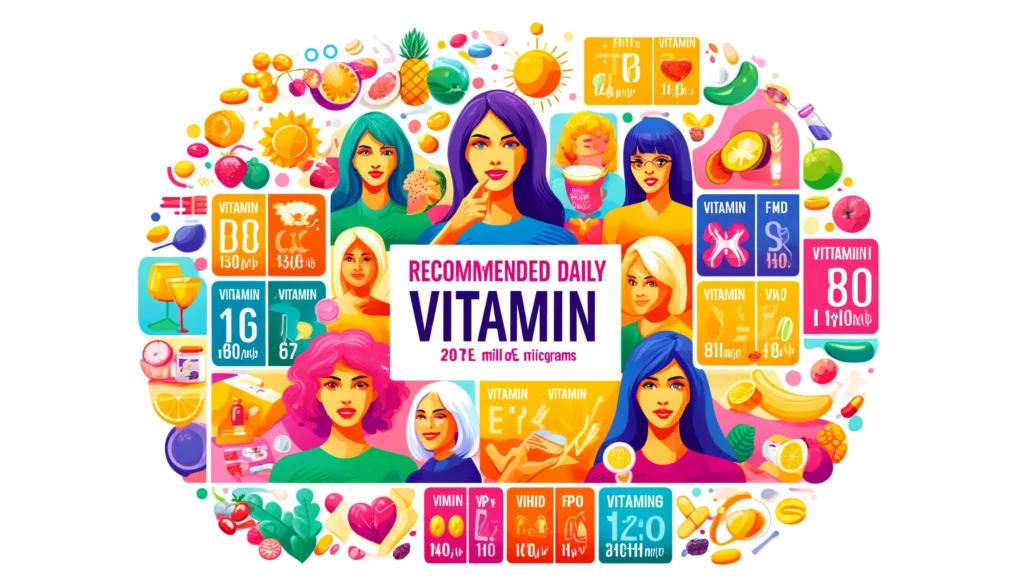
How much vitamin do women need daily for optimal sports performance?
Vitamins are essential components of maintaining good health. More so, when it comes to women participating in sports.
The recommended intake of vitamins is for energy production, recovery, and muscle function, among other innumerable work.
Understanding the basics of vitamins
Vitamins are organic nutrients needed by the body in small amounts for various metabolic functions.
Vitamins fall into two categories:
They are classified into two categories:
- Water-soluble vitamins: These include the B-complex vitamins and vitamin C, which are not stored in the body and need to be consumed daily.
- Fat-soluble vitamins: These include vitamins A, D, E, and K, which are stored in the body’s fatty tissues and liver.
The Role of Vitamins in Sports Performance
For women participating in sports, vitamins are vital for:
- Energy production: B vitamins play a key role in converting food into energy.
- Bone health: Vitamins D and K are essential for maintaining strong bones.
- Muscle function: Vitamins such as E and D are important for muscle repair and function.
- Immune support: Vitamins C and A help in maintaining a robust immune system.
Daily Vitamin Requirements for Women Athletes
To optimize performance and recovery, women athletes need to ensure they meet their daily vitamin requirements. Below is a detailed look at the essential vitamins and their recommended daily allowances (RDA).
1. Vitamin A
- RDA: 700 micrograms (mcg)
- Importance: Vitamin A is crucial for vision, immune function, and cell growth.
- Sources: Carrots, sweet potatoes, spinach, and dairy products.
2. B Vitamins
B vitamins are a group of eight vitamins that are vital for energy production and overall health.
- Thiamin (B1): 1.1 milligrams (mg)
- Sources: Whole grains, pork, and legumes.
- Riboflavin (B2): 1.1 mg
- Sources: Milk, eggs, and green leafy vegetables.
- Niacin (B3): 14 mg
- Sources: Chicken, turkey, and fish.
- Pantothenic Acid (B5): 5 mg
- Sources: Avocados, yogurt, and eggs.
- Pyridoxine (B6): 1.3 mg
- Sources: Chickpeas, bananas, and potatoes.
- Biotin (B7): 30 mcg
- Sources: Nuts, seeds, and salmon.
- Folate (B9): 400 mcg
- Sources: Dark leafy greens, beans, and oranges.
- Cobalamin (B12): 2.4 mcg
- Sources: Meat, fish, and dairy products.
3. Vitamin C
- RDA: 75 mg
- Importance: Vitamin C is essential for collagen synthesis, iron absorption, and immune function.
- Sources: Citrus fruits, strawberries, bell peppers, and broccoli.
4. Vitamin D
- RDA: 600 international units (IU)
- Importance: Vitamin D is critical for calcium absorption, bone health, and muscle function.
- Sources: Sunlight, fatty fish, fortified milk, and egg yolks.
5. Vitamin E
- RDA: 15 mg
- Importance: Vitamin E acts as an antioxidant, protecting cells from damage and supporting muscle repair.
- Sources: Nuts, seeds, spinach, and vegetable oils.
6. Vitamin K
- RDA: 90 mcg
- Importance: Vitamin K is necessary for blood clotting and bone metabolism.
- Sources: Kale, broccoli, and Brussels sprouts.
Factors Affecting Vitamin Needs in Women Athletes
Factors Affecting Women Athlete Vitamin Needs Women athlete is affected by several factors that can alter the needs of vitamins.
Age
Age might determine the amount of energy and nutrient requirement of athletes. Older women need more of B12 and D because of the body’s compromised ability to absorb it.
Competitive intensity and sport type
Difference in the requirement of nutrients. High-intensity sports need more of the vitamins.
Dietary restrictions
Vegetarian and vegetarian’s athletes’ major concern. Such athletes aren’t able to get most of the vitamins easily accessible in animal products.
Environmental Factors
Women who are training in high-altitude or cold environments may also need to consume extra amounts of some vitamins due to the elevated metabolic demands and oxidative stress.
Meeting Daily Vitamin Needs For women engaged in sports, comprehensive and well-balanced daily delivery of vitamins from food is fundamental.
Here are some general recommendations to help in the provision of vitamin requirements:
- Diversify your diet by introducing a wide variety of fruits, vegetables, whole grains, lean proteins, and healthy fats;
- Consider supplementation in some situations when the balance of vitamins is not able to be provided through nutrition. However, supplementation should be discussed with a qualified physician;
- Monitor the blood level and adjust the vitamin intake with supplementation in accordance with the data received. There is no sense in taking more than needed;
- Hydrate. Water is essential for all biochemical reactions in the body. It also supports vitamin absorption into the bloodstream and use in cellular activities.
Conclusion
Daily vitamin intake plays an important role in the daily life of a woman engaged in sports. By understanding the women’s specific needs and focusing on the right daily vitamin intake, professional or amateur women athletes can be sure that they consume enough of the elements they need for the best biological performance.
Regular monitoring and additional provision of vitamins, if necessary, also contribute to hormone balancing and metabolic regulation, increasing the absorption and use of proteins and carbohydrates.
